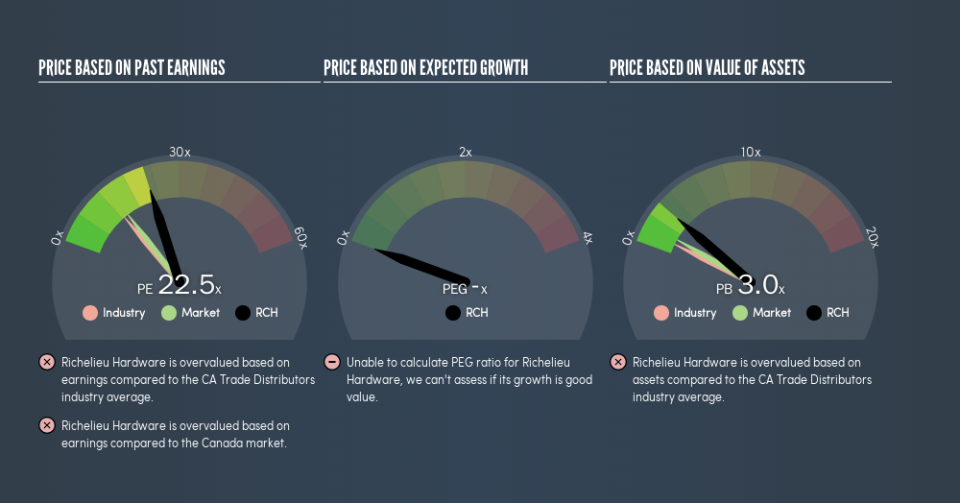Is Richelieu Hardware Ltd.'s (TSE:RCH) High P/E Ratio A Problem For Investors?

This article is for investors who would like to improve their understanding of price to earnings ratios (P/E ratios). We'll look at Richelieu Hardware Ltd.'s (TSE:RCH) P/E ratio and reflect on what it tells us about the company's share price. Richelieu Hardware has a price to earnings ratio of 22.45, based on the last twelve months. That means that at current prices, buyers pay CA$22.45 for every CA$1 in trailing yearly profits.
See our latest analysis for Richelieu Hardware
How Do I Calculate A Price To Earnings Ratio?
The formula for price to earnings is:
Price to Earnings Ratio = Share Price ÷ Earnings per Share (EPS)
Or for Richelieu Hardware:
P/E of 22.45 = CA$25.98 ÷ CA$1.16 (Based on the year to May 2019.)
Is A High Price-to-Earnings Ratio Good?
The higher the P/E ratio, the higher the price tag of a business, relative to its trailing earnings. That isn't a good or a bad thing on its own, but a high P/E means that buyers have a higher opinion of the business's prospects, relative to stocks with a lower P/E.
Does Richelieu Hardware Have A Relatively High Or Low P/E For Its Industry?
One good way to get a quick read on what market participants expect of a company is to look at its P/E ratio. You can see in the image below that the average P/E (12.9) for companies in the trade distributors industry is lower than Richelieu Hardware's P/E.
Its relatively high P/E ratio indicates that Richelieu Hardware shareholders think it will perform better than other companies in its industry classification. The market is optimistic about the future, but that doesn't guarantee future growth. So investors should always consider the P/E ratio alongside other factors, such as whether company directors have been buying shares.
How Growth Rates Impact P/E Ratios
P/E ratios primarily reflect market expectations around earnings growth rates. When earnings grow, the 'E' increases, over time. Therefore, even if you pay a high multiple of earnings now, that multiple will become lower in the future. A lower P/E should indicate the stock is cheap relative to others -- and that may attract buyers.
Richelieu Hardware shrunk earnings per share by 3.0% last year. But over the longer term (5 years) earnings per share have increased by 7.8%.
Don't Forget: The P/E Does Not Account For Debt or Bank Deposits
Don't forget that the P/E ratio considers market capitalization. Thus, the metric does not reflect cash or debt held by the company. Theoretically, a business can improve its earnings (and produce a lower P/E in the future) by investing in growth. That means taking on debt (or spending its cash).
Such expenditure might be good or bad, in the long term, but the point here is that the balance sheet is not reflected by this ratio.
How Does Richelieu Hardware's Debt Impact Its P/E Ratio?
Richelieu Hardware has net debt worth just 1.2% of its market capitalization. So it doesn't have as many options as it would with net cash, but its debt would not have much of an impact on its P/E ratio.
The Bottom Line On Richelieu Hardware's P/E Ratio
Richelieu Hardware has a P/E of 22.5. That's higher than the average in its market, which is 14.2. With modest debt but no EPS growth in the last year, it's fair to say the P/E implies some optimism about future earnings, from the market.
When the market is wrong about a stock, it gives savvy investors an opportunity. As value investor Benjamin Graham famously said, 'In the short run, the market is a voting machine but in the long run, it is a weighing machine.' So this free visual report on analyst forecasts could hold the key to an excellent investment decision.
Of course you might be able to find a better stock than Richelieu Hardware. So you may wish to see this free collection of other companies that have grown earnings strongly.
We aim to bring you long-term focused research analysis driven by fundamental data. Note that our analysis may not factor in the latest price-sensitive company announcements or qualitative material.
If you spot an error that warrants correction, please contact the editor at editorial-team@simplywallst.com. This article by Simply Wall St is general in nature. It does not constitute a recommendation to buy or sell any stock, and does not take account of your objectives, or your financial situation. Simply Wall St has no position in the stocks mentioned. Thank you for reading.

